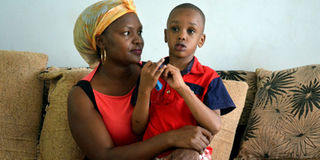A mother raising an epileptic child

Emoru with his mother, he cannot among other things feed himself. Photo by Esther Oluka
Keith Emoru is unlike other children his age. This six-year-old cannot walk but instead, he tiptoes. He is always drooling (dropping saliva uncontrollably from his mouth), and crying about different pains sustained from injuries he gets when he falls during seizures. Rather than play with his eight and five-year-old brothers, he prefers to stay by his mother’s side, resting his head on her lap.
His mother, Esther Namboka, says her son’s health condition started to worry them when he was still a baby. “He often suffered from bacterial infections. And after sometime, his father and I resorted to medicating him with antibiotics. We would stop the medication the moment his condition improved, sometimes without completing the dosage,” Namboka explains.
Genesis of the disease
When Emoru was six months old, Namboka gave him medication to take before leaving home for work. She was working as a loans administrator at Micro Uganda Limited. She instructed the maid to give him medicine at particular time intervals. Emoru was six-months-old at the time.
At about midday, Namboka received a call from her maid. “She told me Keith was in a lot pain and was screaming. I could hear him yelling in the background,” she recounts.
When Namboka got home, she realised that the situation was worse than she had anticipated. “He was running a high temperature and could not stop crying,” she recounts. “I immediately rushed him to a health facility in Bugolobi [a Kampala suburb] where we were referred to Nsambya Hospital for better management.”
A number of tests were conducted and meningitis, which had been suspected, was ruled out. Emoru was later admitted and his condition monitored for two weeks.
“When the doctor asked for his medical history and we told him about the recurrent bacterial infections and medicating him ourselves, he reprimanded us for making such a mistake. He cautioned us against the dangers of not completing doses, adding that we could have been giving him the wrong medication too,” she says.
Emoru’s condition improved and he was discharged. The problem though was that his growth slowed. He did not start to crawl until he was one year old and only said his first few words at two.
Repeated episodes
At two years, Emoru got his first seizure. “After feeding him one day, I asked him to go outside and play with his friends. As he walked away, I heard a loud bang and when I turned around, I saw him lying down on the ground. I ran to his side and realised he was convulsing. The scariest bit was that his eyes were rolled up,” recalls Namboka.
She rushed him to a nearby health centre where he was admitted and observed overnight. The following day, he was back to normal and back home. Two months later, the same thing happened while Emoru was playing at one of the leisure parks in town. Again, he was rushed to hospital, briefly admitted for observation and discharged.
“The episodes would last for about five minutes and sometimes stop before we reached hospital,” says Namboka.
A month later, when he got another seizure, a doctor advised Emoru’s parents to take him to a neurologist for an MRI (Magnetic Resonance Imaging scan).
An MRI uses strong magnetic fields and radio waves to produce detailed images of the inside of the body. “It was such a scary and painful experience watching him lying down on some kind of bed and his head could be wheeled into a compartment,” she says.
When no tumours were detected inside Emorus’s brain, he was referred to Mulago Referral Hospital for an electroencephalogram (EEG). It provides evidence of how the brain functions over time.
“This time round, they had to put wires all over his head and because he could not remain still, he was given a sedative to put him to sleep,” she says. “The results revealed that our son had epilepsy. I broke down and cried and did not know what to do next,” says Namboka.
Emoru was two and a half years old at the time. According to the doctors, the likely cause of Emoru’s epilepsy was a fever that went undiagnosed as a child.
The parents were told that the frequent seizures would eventually affect Emoru’s brain activity.
At home
Emoru was immediately put on treatment but the convulsions became more frequent.
“He could have more than 20 episodes a day, each lasting about five minutes. He would bite his tongue during the seizures causing a bloody mouth,” she says.
To limit injuries to his head, Namboka would lay two mattresses on the floor of the living room to cushion her son’s falls.
Namboka eventually decided to resign her job in 2012, to look after her son.
Managing the situation
Now a mother of three, Namboka says her son’s condition has improved over time due to adherence to treatment. “The seizures have reduced to just one per day sometimes,” she says.
Emoru’s parents had enrolled him into a special needs school but pulled him out due to the expenses. “We were paying about Shs800,000 per month yet he was placed in a class with children who had worse conditions and his needs were not being met,” she says.
Over the years, Emoru has been losing his speech ability. He spoke his last word, “daddy,” two months ago. I do not know if he will be able to speak again,” says Namboka.
The family tried hiring a speech therapist but his fee was Shs700,000 per month so they gave up on that idea.
Over time, Namboka who now owns a private business, has learnt to accept her son’s condition and often organises meetings for parents in similar situations.
At these meetings, parents share their trials, solutions and the hope that their children will get healed and lead better lives.
About Epilepsy
Dr Alex Kakoraki, a general practitioner at Murchison Bay hospital in Luzira advises as follows;
This is a condition that affects one’s mental health. It is usually manifested in form of seizures, also known as convulsions or fits.
Causes
There are several causes of epilepsy depending on the situation. These include:
•Abnormal rate at which impulses pass through the Central Nervous System
•Brain tumors
•Inheritance of the disease
Signs and symptoms
•Dizziness
•Headaches
•Becoming either dull or inactive
•Seizures also known as convulsions or fits
•High blood sugar levels
Influencing or trigger factors
•Staying within hot environments, for instance, near fire or under a lot of sunshine
•Arguments
It is for these two reasons that patients with epilepsy are always advised to either stay away from hot environments or stressful engagements.
Treatment
•It is advisable that the condition is investigated in order to ascertain whether it is epilepsy or not, then they can be prescribed anticonvulsants to control the seizures or have tumours removed if detected.
•Therapy such as speech rehabilitation, and a strong support system for patients and their families, such as counselling is also recommended.




